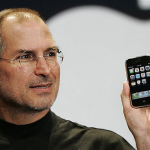By Rose O. Sherman, EdD, RN, FAAN
 Steve Jobs died on October 5th. Many consider him to be an innovative genius who will be viewed historically in the same way as we view Thomas Edison, Benjamin Franklin and Albert Einstein. Although he lived only 56 years, he had a remarkable life. The company he co-founded and led, Apple Inc., is globally renown for cutting edge work in technology. He described his philosophy by using a quote of ice hockey player Wayne Gretsky who said ” I skate where the puck is going to be, not where it is”. As Walter Isaacson so well describes in the new authorized biography Steve Jobs, he was a perfectionist and a demanding leader. Although not all his behaviors are ones that we would want to see emulated in nurse leaders, there is much to be learned from his success and his life.
Steve Jobs died on October 5th. Many consider him to be an innovative genius who will be viewed historically in the same way as we view Thomas Edison, Benjamin Franklin and Albert Einstein. Although he lived only 56 years, he had a remarkable life. The company he co-founded and led, Apple Inc., is globally renown for cutting edge work in technology. He described his philosophy by using a quote of ice hockey player Wayne Gretsky who said ” I skate where the puck is going to be, not where it is”. As Walter Isaacson so well describes in the new authorized biography Steve Jobs, he was a perfectionist and a demanding leader. Although not all his behaviors are ones that we would want to see emulated in nurse leaders, there is much to be learned from his success and his life.
Leadership Vision can bring a Team to a New Level of Performance
Steve Jobs was a tough taskmaster as a leader. Walter Isaacson interviewed dozens of staff who worked with him and they all agreed that he could be brutally dismissive of ideas of his team members. But few who ever worked with him would disagree that he was Apple’s visionary. He believed that the leader’s job was to inspire a vision that would attract the most talented people to work with you. Whether it was the Macintosh, the IPOD, the IPhone or the IPad, he demanded things of his staff that they didn’t believe could be done until they did it.
Product Integration Matters
Steve Jobs believed in simplification and product integration. It was a strong focus in his work. Service and product integration is a major weaknesse in most health care organizations and Jobs saw this first hand during his own illnesses. Isaacson tells a story about how Job’s wife Laurene Powell Jobs called a conference of his health care team because his pain management was fragmented and healthcare providers were not talking to one another. This happened to a man with the resources to pay for the best services available. We know that this is an everyday occurrence in our current system. Simplification and integration need to be key ingredients in health care reform efforts.
The Customer does not always know what They want
Apple under Steve Jobs did not conduct either market research or focus groups prior to introducing new products. He believed that if it is truly revolutionary…they won’t be able to help you design it. In the current US Healthcare Delivery system, a huge emphasis and even reimbursement is placed on the consumer perception of their experiences. While there is some value in this, disruptive innovation in healthcare needs to begin with unlearning the legacy of the models of care that we have perfected over time.
Maintaining an Awareness of your own Mortality can lead to better Decisions
I was once asked when I was young twentysomething nurse what had been my biggest lesson learned so far in my work. I was able to quickly answer that I had a developed a pretty unvarnished view about my own mortality. As nurses, we work in settings every day where we see how life can take unexpected turns. Yet in leadership, we sometimes forget this. During a 2005 commencement address, Jobs spoke about how remembering that he would soon be dead is the most important tool that he had encountered to help him make the big choices in life. He told these graduating students that “all external expectations, all pride, all fear of embarassment or failure – these things just fall away in the face of death, leaving only what is truly important. Remembering that you are going to die is the best way I know to avoid the trap of thinking that you have something to lose. You are already naked. There is no reason not to follow your heart”.
Read to Lead
Isaacson, W. (2011). Steve Jobs. New York: Simon & Shuster.
[amazon asin=1451648537&template=iframe image&chan=default]
Steve Jobs’s 2005 Stanford Commencement Address
© emergingrnleader.com 2011


 LinkedIn
LinkedIn Instagram
Instagram